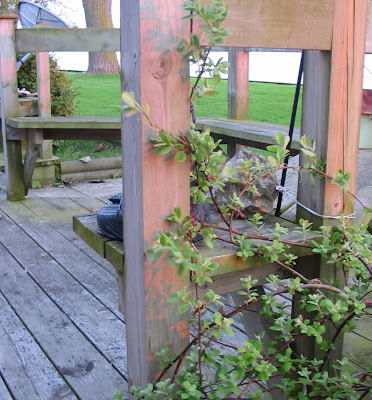
As I watched the setting sun illuminate the ragged edge of this cloud, a phrase from Shakespeare drifted into my head: “sleep knits up the raveled sleeve of care.” I went online to find which play it was from (Macbeth) and discovered a linguistic puzzle that will appeal to any SWFers who are also "wordies." If you have the time and inclination, do read on, but it’s entirely optional.
 Here, from www.phrasefinder.org, and the archives of the Columbia Journalism School online, Language Corner. Brush Up Your Shakespeare, Act III, Raveled Sleave, with an "A."Find the misspelling: "Sleep, as Shakespeare wrote, knits up the raveled sleeve of care." No, not "raveled," though it can be spelled differently. The error, a very frequent one, is "sleeve." Macbeth wasn't talking about the arm of a garment; it wouldn't really make sense. He was talking about a tangled skein, of silk or other material, which makes perfect sense. And for that, the spelling - which the original author used, correctly - is "sleave." It's an obsolete word now, but spelling it right is still the way to go. Many readers may dismiss it as just another typo (a NEXIS search shows it's a frequent typo for "sleeve"), but those who know better will smile.
Here, from www.phrasefinder.org, and the archives of the Columbia Journalism School online, Language Corner. Brush Up Your Shakespeare, Act III, Raveled Sleave, with an "A."Find the misspelling: "Sleep, as Shakespeare wrote, knits up the raveled sleeve of care." No, not "raveled," though it can be spelled differently. The error, a very frequent one, is "sleeve." Macbeth wasn't talking about the arm of a garment; it wouldn't really make sense. He was talking about a tangled skein, of silk or other material, which makes perfect sense. And for that, the spelling - which the original author used, correctly - is "sleave." It's an obsolete word now, but spelling it right is still the way to go. Many readers may dismiss it as just another typo (a NEXIS search shows it's a frequent typo for "sleeve"), but those who know better will smile. I questioned the notion that a raveled
sleeve of a garment wouldn't "make sense." I think part of the question stems from Shakespeare’s use of the word
raveled, which, like sleave, is also pretty obsolete these days. So I checked out the definition of "ravel" in several online dictionaries, as well as my own hardcover Webster's, and found something very intriguing: ravel mainly survives in contemporary English usage in
unravel, which would appear to be its opposite, but not so according to the dictionaries. Every entry for
ravel listed
unravel among the synonyms for ravel! Here's a sample entry from www.thefreedictionary.com.
rav·el v.tr.1. To separate the fibers or threads of (cloth, for example); unravel.2. To clarify by separating the aspects of.3. To tangle or complicate.v.intr.1. To become separated into its component threads; unravel or fray.2. To become tangled or confused. (from www.theefreedictionary.com)So it seems to me that since both ‘ravel’ and ‘unravel’ can mean the same thing, a raveled
sleave might be thought of as part of an unknit garment, while a raveled
sleeve might simply be part of a garment in need of repair. In fact, I once had a raveled sleeve on a favorite sweater, back in my student days. But rather than knitting it up (which, admittedly, it made no sense to even try), I just covered it with a pair of iron-on suede elbow patches. In the end, in spite of the peculiarities of the English language, what really matters in this quotation is what Shakespeare wrote, and that was, according to experts, undoubtedly "sleave."
To view more skies from all around our beautiful planet, or to join in, visit
SKYWATCH. Live links after 2:30 p.m. EST time or 19:30 GMT


















































